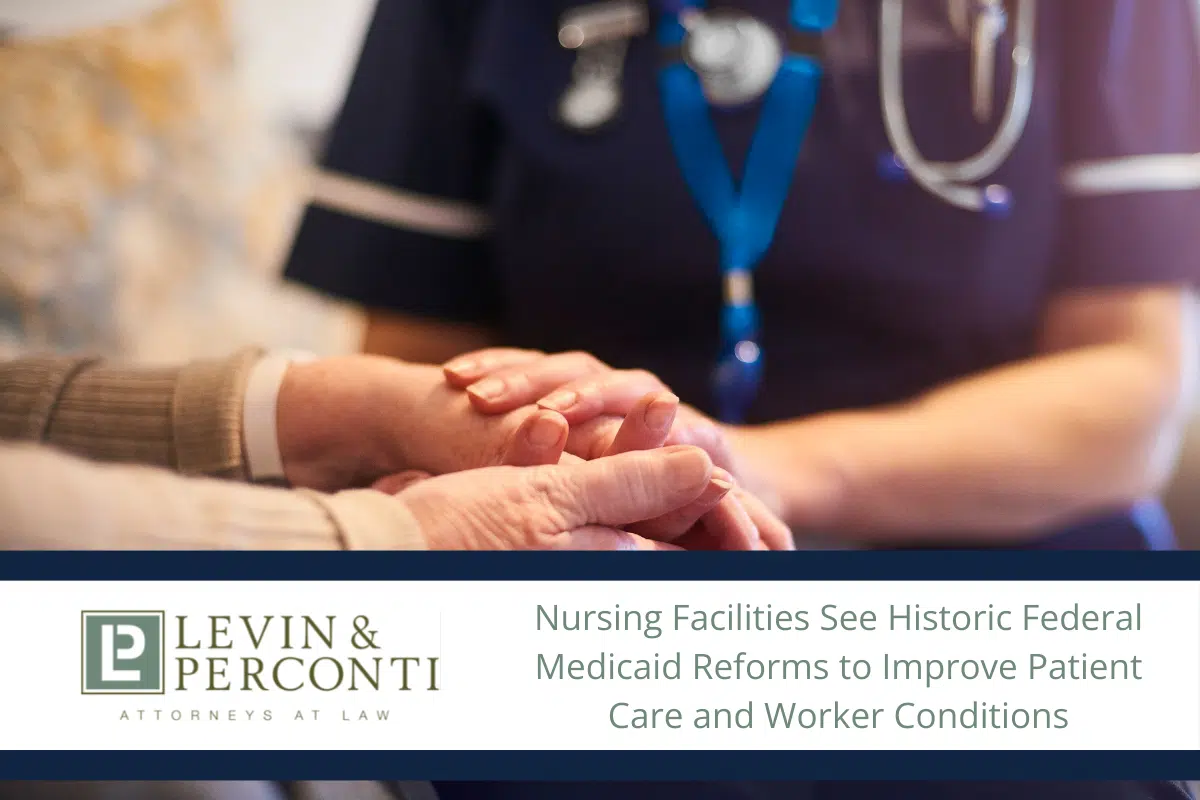
Content Reviewed by:
Steven M Levin
Content Reviewed by: Steven M Levin
Since 1976, Steve Levin has been dedicated to helping people injured by others’ negligence. He is one of the first attorneys in the U.S. to prosecute nursing homes for abuse and negligence. He’s also helped write new legislation that governs the operation of nursing homes, including the Illinois Nursing Home Care Act. Moreover, Levin & Perconti has obtained the top three jury verdicts in nursing home negligence cases in Illinois.
The Centers for Medicare & Medicaid Services has issued three historic final rules to improve patient care at federally funded nursing facilities, increase all Medicaid recipients’ access to care, and reform the working conditions for direct care workers. These new final rules, issued on April 22, 2024, will be phased in over the next six years.
The Biden administration has faced strong opposition to these rules from nursing homes and caregiving agencies that claimed they would create unreasonable administrative and financial burdens on care providers. With the rules, regulators seek to force care providers to invest more of their federal funding in staffing, require transparency from Medicaid providers, and give all Medicaid patients access to care within a reasonable time frame. These new rules alone will not end nursing home abuse, but they are important steps in accomplishing that end.
Managed Care Rule
The Managed Care Rule is also known as the Medicaid and Children’s Health Insurance Program Managed Care Access, Finance, and Quality Final Rule. It establishes maximum appointment wait times, including a 15-day maximum for primary care appointments. States will be required to monitor compliance through “secret shopper” and annual enrollee surveys. States will also be required to maintain a public website displaying Medicaid’s payment rates.
This rule will benefit all Medicaid patients who rely on outpatient care, particularly elderly and disabled patients who need more frequent care.
Ensuring Access to Medicaid Services Rule
The Ensuring Access Rule requires home- and community-based services, or HCBS, to allocate 80 percent of their Medicaid payments to direct care staff, including nurses, nursing assistants, and nursing supervisors. Providers have six years to fully comply with this requirement.
This aspect of the Ensuring Access final rule should improve patient care and reduce abuse in CILA facilities, home health care, and other community-based services by providing better working conditions for direct care workers and attracting more direct care staff.
Increasing Transparency and Accountability
The Ensuring Access rule also vastly increases the transparency of Medicaid providers by establishing new advisory committees that include Medicaid beneficiaries, their families, and their caregivers. States must also publish financial information at least every two years, including the following:
- Average hourly pay rates for direct care workers
- Medicaid payment amounts for services
- A comparison of fee-for-service rates with Medicare payment rates
Minimum Staffing Standards for Long-Term Care Facilities
This historic final rule imposes long-overdue minimum staffing hours in nursing homes certified by Medicaid and Medicare. It marks the first time the federal government has established minimum staffing requirements for nursing homes.
Before the new rule, the federal government mandated that nursing homes hire sufficient staff to meet residents’ needs. However, it left the number of staff members to the discretion of nursing home operators. The new rule imposes the following requirements on skilled nursing facilities:
- 3.48 hours of nursing care per patient per day, with at least 0.55 of those hours of care provided by an RN and 2.45 hours by a nurse aide
- A registered nurse on-site 24 hours per day, seven days per week
- A stronger annual facility assessment
- A staffing plan that will attract more nursing home staff and reduce turnover
What the Minimum Staffing Standards Rule Means for Nursing Home Residents
Understaffing in nursing homes is the primary driver of nursing home abuse and neglect. Staff who work in understaffed working homes are stretched too thin to meet the needs of every resident, regardless of how dedicated they are. This results in a high turnover rate and a poor working environment. The residents pay the ultimate price, often being forced to live with the following effects of understaffing:
- Staff become frustrated and take it out on residents.
- Staff cannot provide the necessary supervision to prevent falls and other accidents.
- Staff fail to reposition and monitor immobile residents, resulting in bedsores.
- Staff make medication errors and fail to report changes to doctors.
- Abusive staff, fellow residents, and visitors abuse or exploit residents without detection.
- Sanitation and infection control suffer.
- Staff resorts to indwelling catheters and inappropriate psychotropic drugs as substitutes for care.
These are just a few examples of the consequences of understaffed nursing homes. This new rule is a step in the right direction to improve residents’ quality of care and prevent abuse and neglect.
Does the New Rule Go Far Enough to Protect Nursing Home Residents?
Many states have already established nursing home staff minimums. In Illinois, the minimum staffing ratios exceed the new federal requirements in most categories, as shown below:
Despite these higher requirements, Illinois care facilities are not regulated enough to prevent abuse. Illinois is one of the worst states in the nation for sexual abuse, misuse of psychotropic drugs, and staffing shortages.
We support the addition of federal minimum staffing levels. However, unless there is adequate enforcement of the staffing regulations, nursing home residents will continue to suffer daily abuse and neglect regardless of how many hours of care are required.
A Step in the Right Direction
The three new rules are important steps in promoting better access to care, transparency, and quality of care for all Medicaid beneficiaries. Although the measures still do not go far enough to protect nursing home residents, we applaud the attention the Biden administration is giving to staffing problems in nursing homes. Nursing homes will only hire adequate staff when required to do so. Establishing federal minimum staffing standards is an important first step.
Our attorneys have long advocated for federal and state regulations to provide better oversight and protection of our most vulnerable citizens, many of whom live in skilled nursing facilities. We have helped write legislation and even testified before Congress and the state legislature in support of change.
Too often, nursing home operators prioritize profits over people. Meanwhile, we will continue to hold nursing homes accountable when they allow innocent residents to suffer abuse and neglect. Our goal is to use litigation to make it more expensive for nursing homes to allow abuse than to provide safe, hospitable environments for residents.
Holding Nursing Homes Accountable for Abuse and Neglect for Over 30 Years
Our founder, Steven Levin, was one of the first nursing home abuse lawyers in the nation to stand up for abused and neglected nursing home residents. We have obtained numerous record-setting verdicts and settlements in nursing home abuse cases, including the following:
- $4.1 million nursing home verdict for a medication error
- $2.9 million record wrongful death nursing home verdict
- $2.8 million record nursing home bedsore settlement
- $2.7 million wrongful death nursing home verdict
- $2.3 million assisted living facility bedsore settlement
- $1.5 million Nursing Home Care Reform Act settlement
If you or your loved one has been abused or neglected in a nursing home, contact us today using our simple online form or by calling (312) 332-2872 to schedule a free consultation.



